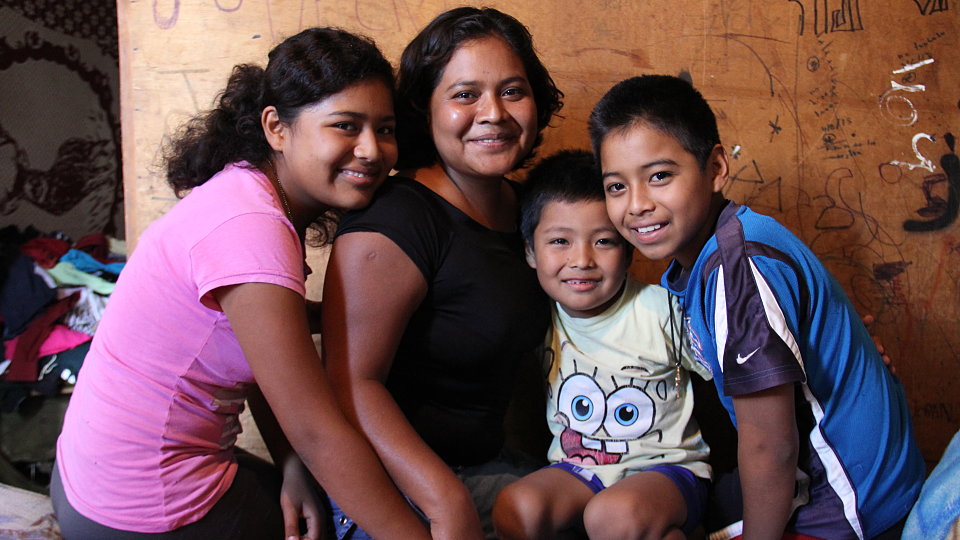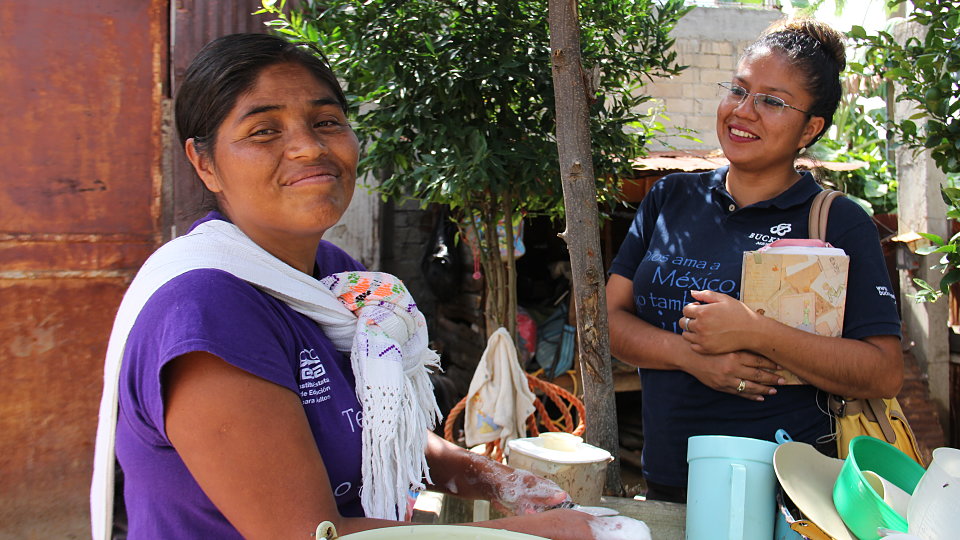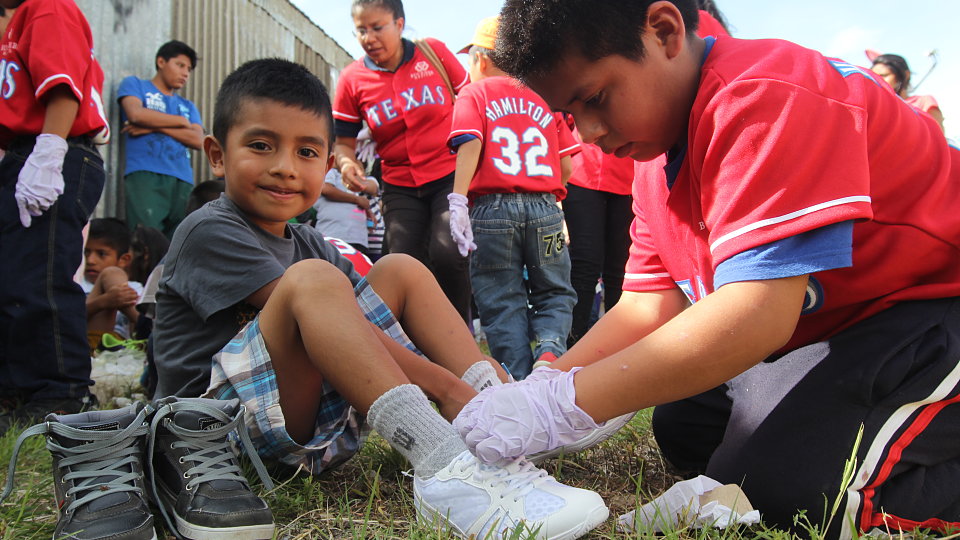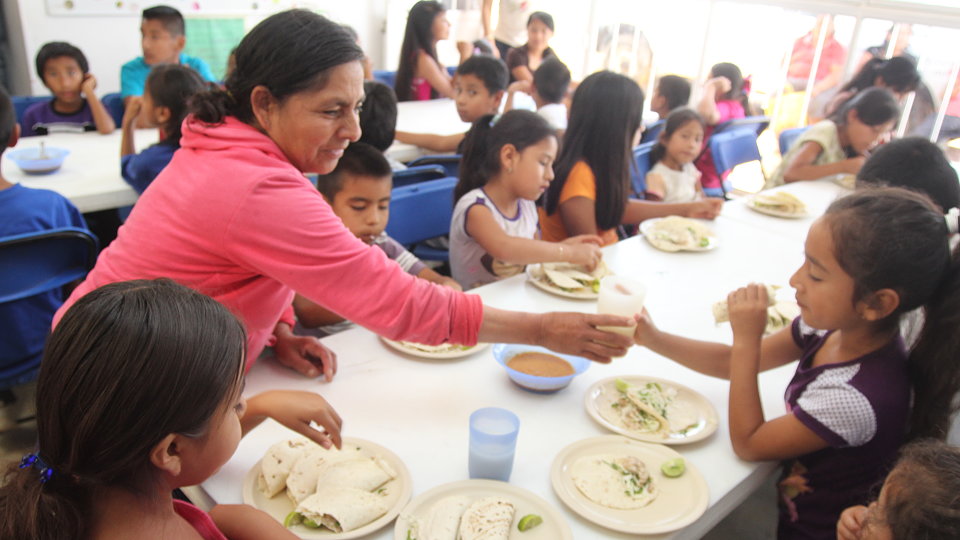Living on the edge
Vicki Ruiz Garcia’s cinder block home ends at the first floor, but her flat concrete roof offers spectacular views of the mountains surrounding the Xoxocotlan colonia and the nearby city of Oaxaca, Mexico. It also offers her a place to cook corn tostadas, which she sends daily to Oaxaca to sell.
The home is bustling, with oldest daughter Jenifer helping her mom and younger siblings Jonathan and Joran running around the house – being boys.
Ruiz, surrounded by the smoke of her upstairs cooking fire, has a constant smile as she works with Jenifer. It’s a smile, she says, that comes from gratitude for services the Buckner Family Hope Center here provided her and her husband, who is struggling with alcohol addiction. Before Buckner’s intervention, the family was living on the edge of dysfunction.
“The Hope Center has brought the family closer together,” she says while stirring a pot of hot chocolate for visitors. “Because there used to be a lot of screaming and messes everywhere and even punching. Now that is all in the past. Now we talk to our children and they listen and give respect to the family.
Ruiz was wary of the Hope Center prior to enrolling in the program, but Jonathan soon helped her gain the confidence to see what it could provide their family. She was invited to a dinner at the Hope Center to discover what it had to offer. What she found was much more than food.
“There is a lot of support available for us,” Ruiz says. “Not only do we receive support, but we can provide them with volunteer services as well. We can go there and cook. Our kids can go to Bible readings and baseball games. They can learn how to be a bit more organized because, before that, the house was a mess.”
In addition to services found at the Hope Center, the family also was assigned to Biridiana “Biri” Reyes Trujillo, the Family Hope Center’s social worker. She assessed the family’s issues, from disorganization to cleanliness to anger management, and stepped in with help and support geared toward emotional and financial self-sufficiency.
“To be honest,” Ruiz says. “It was very messy. Biri can tell you. She saw how it used to be. Now, thanks to them, we have been a bit more adjusted to having things in order because she has been here and explained to us how things should be. There were just so many changes. I didn’t know how to handle the kids; now I do. I have learned to receive and give, and also with my husband. Thanks to her help, my family is a lot more stable now. No more yelling and fighting. Everything is well balanced.”
The family’s finances are more predictable, too, she adds. “Our house used to be very humble, a lot more humble. It was made out of tin and, with hard work and effort and saving money, we were able to build a more stable home thanks to my dad and my husband, and we are making it work. With the house, and the kids, and my work selling tostadas, we get by.”
Frontier reality
The colonia of Xoxocotlan (hoho-coat-LAHN) is one of many outside of Oaxaca, Mexico. Growing from the edge of the city and radiating out, they often are a mix of tin homes as families buy lots and start fresh construction and larger, cinder block houses, indicating a family has accumulated enough wealth to use the more durable – and expensive – blocks to establish permanent roots.
This is a working-class colonia, with many of the men working from daylight to dark in construction or agriculture. Most families have livestock and small gardens to augment low wages.
Xoxocotlan is experiencing rapid growth as families looking for more space away from the city to locate here. It still has the feel of a frontier area: new, raw and earthy, with one foot in the city and one in the surrounding rural scenery. The only feature of the landscape that lets you know you’re not in virgin territory is the nearby ruins of the Zapotec fortress-city Monte Alban, deserted now for almost 1,000 years.
While families build here to start a new life, frontier areas have always held their own set of issues. It’s a hard life and, as any student of frontier history knows, living on the edge is hard on men, but often hardest on women and children.
“Most of the families share characteristics like a lack of education,” Reyes explains. “Some have different characteristics of violence -- almost all do. Some families are not even aware of the importance of education and positive discipline in their homes. In some of the families, or most of them, they lack basic things such as personal and household hygiene.”
To counter these issues the Hope Center assesses families through a social-economical examination, where it looks at things like daily incomes, expenses, characteristics of the home, materials of which it is built, whether it is theirs, rented or borrowed. They use that examination to work with the family and provide the level of support they need.
Buckner staff members also physically observe the children, Reyes says, “because sometimes deficiencies in health are displayed in their facial complexion, signs of malnutrition or physical underdevelopment. These characteristics are also included in the social-economical examination so it gets included in their record, and they get the help they need. There are many families that wish they could join the program; however, we try to deliver these services to those who need it most.”
Carlos Rodriguez, who coordinates all of Buckner Mexico’s work in the Oaxaca region, says the key to success is matching a family’s needs and initiative with the right solutions.
“For example, Vicki Ruiz Garcia’s children are part of the feeding program, the after-school program and some other activities we do; actually they are part of the VBS class too,” Rodriguez says. “A lot of families really need it, but a few of them, just like Vicky’s family, want to really develop themselves.”
To underscore his comment, he points to the home of Rosita Miguel Lopez. Miguel cares for six children, one of who is severely handicapped. Rodriguez says the Miguel children, more than anything, needed help with their behavior.
“She’s a very hard worker,” he says. “She works cooking food to sell it on the street, as well as fruit. She used to do somebody else’s cleaning, and actually, all that work with a baby on her back.”
Miguel first came to the Hope Center through the children’s feeding program. She learned about the Hope Center from her children’s school and a friend informed her all her children could be included in the program.
Once in the door, the Miguel children showed signs of other needs, mainly in their behavior and discipline. She agreed with the assessment. Staff and volunteers helped the children behave better both at the Hope Center and at home, a strategy that’s resulted in success. “The children have modified their behavior regarding discipline,” Reyes says. “They have learned to be a bit more responsible and manage their time a little better. They have turned away from bad behaviors, and they follow their mom’s directions more easily. They have become more obedient kids.” With support from the Hope Center, Miguel has changed the way she communicates with her children, and in the process, her children have learned to support their mother as well. Fighting has ceased and there is a peace in the family that was absent before. “I am very proud of the entire family, all of them, and of how they communicate and behave,” Reyes says. “It makes me very happy when I see Mrs. Rosita.”
‘Holistic’ strategy includes spiritual element
“We try to be as holistic as we can,” Rodriguez explains about the Hope Center’s strategy. “I’m talking about education, nutrition, health, development of skills, workshops: basically, all of those programs accompanied by spiritual development.”
María Hernández Aquino, a mother who lives in the community leads the spiritual development portion of the Hope Center’s work and cites it as a key factor in the families’ other successes.
“Serving comes from my heart,” Hernández says of the work. “I believe God put the desire in me. I enjoy serving people, especially people in need, and looking at the satisfaction in their faces, even if they don’t know how to say ‘thank you, I needed that.’ Just seeing it in their faces makes me really happy, and I like to do it all the time to feel useful to God.”
When Wendi Triste Mendoza lost her husband to cancer a year ago and found her family of four destitute and without a home, she needed tangible care. Before his death, the Hope Center already provided not only social services and a place to stay, but spiritual support from Hernández as well.
“He passed away and it was a very hard time for the family,” Rodriguez recalls. “Maria and her family were always taking care of them, especially for Wendi, that was important.”
Hernández’s strategy was simple: sharing Christ through her presence and her example while also sharing ways to support her family. When Triste was feeling lonely, Hernández would come by her side, and slowly she was able to move on. Hernández taught her how to make donuts and earrings so she could sell them as a way to support herself financially.
“Wendi didn’t have any family and, in a way, we became her siblings, her family,” Hernández says. “We stood by them in the most difficult moments, and we helped them change, like in their ability to forgive. They didn’t know how to forgive, especially her. She held too many grudges. Now she knows Christ, and there are people who show her how to love, how to forgive.”
“You need a place where you feel accepted, where you can share your problems and express what you’re feeling without the fear of it becoming rumor or gossip,” Triste adds. “We were having a hard time. We needed to find a place to help us for support. All the time he was sick and needed support, Buckner gave it to us: medications, spiritual help, humanitarian help. We have received a lot of support from Buckner.”
The most valuable help received though was “the warmth of family.”
“Unfortunately growing up, I didn’t have a house, a family or home. I grew up in three different houses,” Triste says. “When you come to Buckner, you feel like part of a family. Buckner hugs us like a family member.”
Having the Buckner family a part of her life has influenced Triste, and the change is apparent, even at just a glance.
“She is different now, she has many friends. She has learned to forgive her family, her parents, and all the people who have hurt her,” Hernández says. “She has even changed her face and now she smiles, and one thing she didn’t know how to say was “thank you,” and now she is a very grateful woman.”









